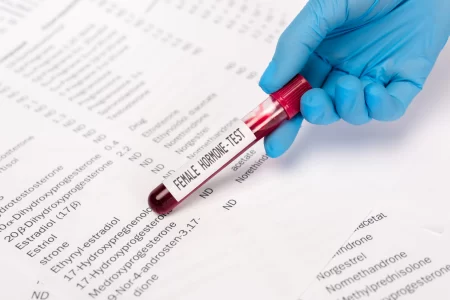 Hormonal activity plays an important role in the physical and mental health of every person. Although many of us may take them for granted, hormones are responsible for numerous physiological and mental processes throughout our lives.
Hormonal activity plays an important role in the physical and mental health of every person. Although many of us may take them for granted, hormones are responsible for numerous physiological and mental processes throughout our lives.
For example, they are responsible for such vital functions as metabolism, growth rate, fertility, and others.
That is why hormonal imbalance has several catastrophic consequences for human health, manifested in the form of diseases and other disorders that reduce the quality of life.
1. Pimples
If pimples are chronic and constantly inflamed, it may be worth checking for androgen imbalance. Androgens are male hormones, such as testosterone.
This group of hormones stimulates the excessive production of sebum, which clogs the pores, forming small pimples and acne.
2. Sleep disturbance
A drop in progesterone levels before menstruation causes insomnia in some women.
Progesterone is aimed at relaxing the body. When its level drops, a person feels excited and is in a state of stress.
3. Constant feeling of hunger
A constant craving for food is an obstacle to any weight loss. Chronic hunger is sometimes caused by a hormonal imbalance.
Sleep deprivation has been shown to increase levels of a hormone called ghrelin, which stimulates hunger.
The level of the hormone leptin, which is responsible for appetite control, also decreases.
4. Mood swings and depression
A large part of the female population suffers from mood swings before the start of the cycle, during pregnancy, and during menopause.
Hormonal changes during this period increase stress and cause depression and other negative emotions that we can usually handle in other situations.
5. Migraine and headache
During certain periods of the menstrual cycle, hormonal changes can cause headaches and migraines.
They can last for a long time, so we advise you to visit a doctor to determine their cause.
6. Problems with digestion
Cortisol, otherwise known as the stress hormone, causes several physical reactions in the body.
In some, it leads to an increase in muscle tension, causing a headache, in others – only sudden mood swings.
But a certain category of people face problems with the digestive system, for example, inflammation, pain, or constipation.
Patients with irritable bowel syndrome often suffer from abnormal levels of serotonin.
7. Chronic fatigue
Exhaustion, or fatigue, is the result of excessive stress, excitement, or intense physical activity.
However, chronic fatigue can also be the result of an underactive thyroid, causing a condition such as hypothyroidism.
This condition causes sudden weight gain because thyroid hormones are responsible for regulating the body’s metabolism.
8. Changes in the breast
High estrogen levels increase breast pain and tenderness. In some cases, this can lead to the formation of tumors and cysts.
For this reason, periodic breast examination is extremely important. Do regular breast self-exams at home to check for lumps.
9. Low level of libido
Hormonal imbalance is one of the leading causes of decreased sex drive in women. This symptom usually occurs as a direct result of declining estrogen levels during menopause.
Picture Credit: VistaCreate